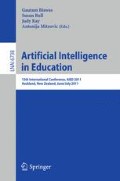Abstract
Learning by problem-posing is a promising way to learn arithmetic or mathematics. We have already developed several interactive learning environments for learning by problem-posing. In this research, we have paid a special attention to “reverse-thinking problems” in arithmetic word problems that can be solved either by addition or subtraction. In the reverse-thinking problems, since “story operation structure” and “calculation operation structure” are different, they require learners to comprehend the relations between problems and solutions more than “forward thinking problems” where “story operation structure” and “calculation operation structure” are the same ones. Based on a learning environment for posing the forward thinking problems developed previously, we have expanded it for reverse thinking problems. This learning environment has been used in a class of fourth grade at an elementary school for eight lesson times. We have also reported the results of this practical use.
Access this chapter
Tax calculation will be finalised at checkout
Purchases are for personal use only
Preview
Unable to display preview. Download preview PDF.
References
Polya, G.: How to Solve It. Princeton University Press, Princeton (1945)
Ellerton, N.F.: Children’s Made Up Mathematics Problems: A New Perspective on Talented Mathematicians. Educational Studies in Mathematics 17, 261–271 (1986)
Yu, F., Liu, Y.H., Chan, T.W.: A Networked Question-Posing and Peer Assessment Learning System: a Cognitive Enhancing Tool. Journal of Educational Technology Systems 32(2), 211–226 (2003)
Nakano, A., Hirashima, T., Takeuchi, A.: Problem-Making Practice to Master Solution-Methods in Intelligent Learning Environment. In: Proc. of ICCE 1999, pp. 891–898 (1999)
Hirashima, T., Nakano, A., Takeuchi, A.: A Diagnosis Function of Arithmetical Word Problems for Learning by Problem Posing. In: Proc. of PRICAI 2000, pp. 745–755 (2000)
Hirashima, T., Yokoyama, T., Okamoto, M., Takeuchi, A.: Learning by Problem-Posing as Sentence-Integration and Experimental Use. In: Proc. of AIED 2007, pp. 254–261 (2007)
Silver, E.A., CAI, J.: An Analysis of Arithmetic Problem Posing by Middle School Students. Journal for Research in Mathematics Education 27(5), 521–539 (1996)
Kintsch, W., Greeno, J.G.: Understanding and Solving Word Arithmetic Problem. Psychological Review 92-1, 109–129 (1985)
Mayer, R.E.: Frequency norms and structural analysis of algebra story problems into families, categories, and templates. Instructional Science 10, 135–175 (1981)
Mayer, R.E.: Memory for algebra story problem. Journal of Educational Psychology 74, 199–216 (1982)
Riley, M.S., Greeno, J.G., Heller, J.I.: Development of Children’s Problem-Solving Ability in Arithmetic. In: Ginsburg, H. (ed.) The Development of Mathematical Thinking, pp. 153–196. Academic Press, London (1983)
Author information
Authors and Affiliations
Editor information
Editors and Affiliations
Rights and permissions
Copyright information
© 2011 Springer-Verlag Berlin Heidelberg
About this paper
Cite this paper
Hirashima, T., Kurayama, M. (2011). Learning by Problem-Posing for Reverse-Thinking Problems. In: Biswas, G., Bull, S., Kay, J., Mitrovic, A. (eds) Artificial Intelligence in Education. AIED 2011. Lecture Notes in Computer Science(), vol 6738. Springer, Berlin, Heidelberg. https://doi.org/10.1007/978-3-642-21869-9_18
Download citation
DOI: https://doi.org/10.1007/978-3-642-21869-9_18
Publisher Name: Springer, Berlin, Heidelberg
Print ISBN: 978-3-642-21868-2
Online ISBN: 978-3-642-21869-9
eBook Packages: Computer ScienceComputer Science (R0)

